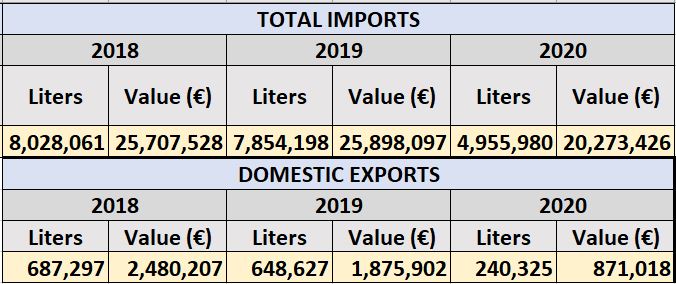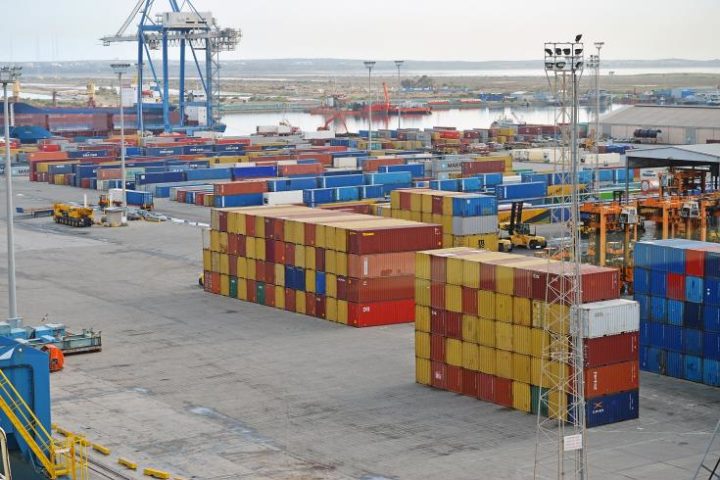Amid the coronavirus crisis, Cypriot wineries are on the move to reach new export markets, investing in more contemporary methods and infrastructure for better quality.
Cyprus wineries have been playing catch up locally with imported wines, as it has just a 35-40% share of the local market, while exports have never been their strong card.
The coronavirus crisis has seen them lose access to restaurants and hotels, shattering local consumption.
However, Cypriot wineries have not thrown in the towel, investing in upgrading infrastructure and wine quality to conquer the local market and boost exports.
Local producers also experiment with employing new distillery methods to produce higher quality products made from old vineyards.
According to data from the Commerce Ministry, more than 80 small, regional wineries situated in the hillside villages of the grape-growing regions produce various characterful wines, many of which are blended with established foreign varieties of grape.
Alongside the four larger ETKO, KEO, SODAP and LOEL wineries, they make up the country’s wine industry.
Vlassides winery CEO Sophocles Vlassides told the Financial Mirror that local wineries are more concerned over winning back the local market from imported wines.
With just 6-7% of their production sent abroad, Vlassides said the bet is to build a brand to win over Cypriot wine lovers.
“Local wineries have taken a beating with the coronavirus crisis and measures imposed; some wineries being pushed to the ground,” said Vlassides.
Not taking it lying down, the industry is plotting a comeback.
“Local wineries have the lion’s share of the market in Famagusta, thanks to local hotels, while we hold a good percentage of the market in Limassol and Paphos.
“Nicosia, however, is another story altogether, as a lot needs to be done to convince the capital’s residence that Cyprus wines are worth the money.”
Wineries are experimenting with new methods such as maturing wines in barrels made of different types of wood and in cement egg-shaped containers.
“This will have an impact on the price, but go a long way in upgrading our products, delivering premium wines to the table.
“Winemakers in Cyprus firmly believe that in the coming years, local wines will be able to go head to head with higher-priced wines in the category sold at €7-12 a bottle.”
Cyprus wines cannot compete with cheaper imported wines as costs are too high.
Orestis Tsiakkas of Tsiakkas Winery said that Cypriot wineries have not given up hope on exports while concentrating on the local market.
“Focus remains on the local market, but local wineries have not stopped looking abroad.
“Cyprus wines have recently attracted the attention of importers from Jordan, France and the United States,” said Tsiakkas.
He revealed that his winery exports to 10 countries while in negotiations with importers from another two.
Cyprus’ main competitor is France, but local wines are gaining ground.

Cypriot wines have been attracting more attention abroad after winning industry awards.
“In 2008, Cyprus wines only brought home three awards in the Decanter World Wine Awards. In 2018, Cypriot wines won more than 75,” said Tsiakkas.
“At the same time, we need to work on our image in Cyprus and try to convince Cypriot wine drinkers that local wines are just as good as imported ones.”
With wineries oriented towards producing more refined tastes, they might be losing older generations accustomed to traditional flavours.
“We have seen younger generations keener to try our wines.
“We have seen participants at wine tasting events getting younger, while younger people are touring wineries to get a firsthand experience on how local wines are made.
“The wine industry has developed over the last few decades, upgrading vineyards, hiring talent to perfect their products to meet consumer demand to compete better,” said Tsiakkas.
Zambartas winery is also looking abroad to increase sales and mitigate the effects of the COVID-19 pandemic, which has seen local consumption slump as hotels and restaurants were closed for most of 2020.
“We are currently opening up to Ireland and the UK, and the USA.
In 2020, we saw an increase of 12% in our exports, but unfortunately, that did not help much in keeping our sales at pre-COVID levels,” said Zambartas.
Joining forces
He said winemakers have been pulling together to promote Cyprus wines, leaving aside any business rivalry.
“We have seen wineries join forces, creating synergies such as a common delivery platform to save on costs.
“But the most important outcome of wineries pulling together is the creation of a joint Cyprus Wine Promotion Company.”
Currently, 13 wineries are part of the Company aiming to promote Cyprus wines.
“More needs to be done. There is an issue of proper placement, proper labelling, better branding that needs to be addressed.
“Local restaurants and hotels could help by introducing a special wine list with only Cypriot wines.”
Zambartas argued that Cyprus should focus on its rare and old grape varieties such as Promara, Maratheftiko and the Martzelina from 100-year-old vineyards.
Commerce Minister Natasa Pilides last week presented the country’s first National Action Plan for promoting Cyprus wines for 2021-23.
Pilides said wineries would benefit from a €1.65 mln incentive scheme put forward by her ministry in cooperation with the Agriculture Ministry and the Cyprus Agricultural Payments Organisation.
In comments to the Financial Mirror, Agriculture Ministry official Socrates Socratous said the ministry is securing funding from the EU.
“Cyprus wineries are eligible for up to 50% funding for projects to upgrade their infrastructure, equipment and other quality enhancement projects,” said Socratous.
“Earning the trust of the local market will definitely contribute towards boosting the demand for Cyprus wines abroad.”
Socratous argued that convincing local restaurants and hotels to promote and introduce tourists to Cyprus wines would boost consumption and brand awareness.
“They would be helping to create the best ambassadors for Cyprus wines, as wine-loving tourists would be searching for Cyprus wines when they get back home, boosting demand.”










